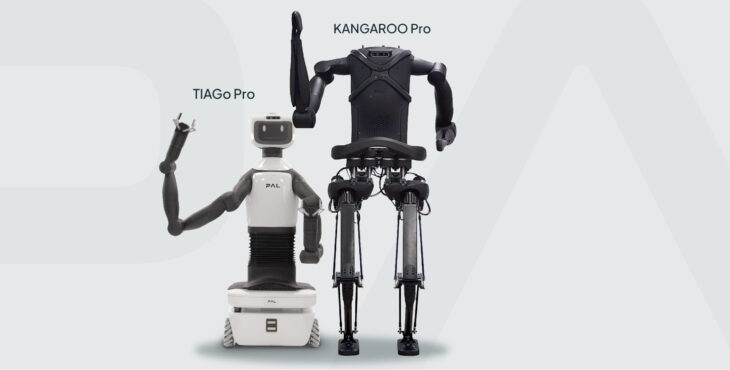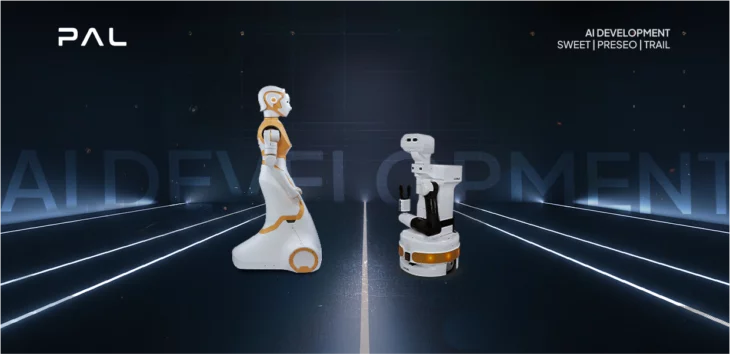We took part in the 2023 IEEE/RSJ International Conference on Intelligent Robots and Systems (IROS 2023) which was held at Huntington Place in Detroit, Michigan, USA from 1-5 October. IROS is one of the largest and most impacting robotics research conferences worldwide and here we talk more about our highlights of this key annual event in the robotics calendar.
IROS is a valuable forum that brings together the robotics research community from around the globe to explore science and technology in intelligent robots and smart machines. It’s an opportunity to explore the latest trends, designs, and groundbreaking outcomes in the field.
The event is sponsored by IEEE (Institute of Electrical and Electronics Engineers), RSJ (The Robotics Society of Japan), IEEE Robotics & Automation Society, IES (the IEEE Industrial Electronics Society), SICE (Society of Instrument and Control Engineers), and the NIF (New Technology Foundation).
During the event our team exhibited at the PAL Robotics booth, contributed to research papers and presented a tech talk. Read on to find out more about our participation in IROS 2023.

The Next Generation of Robotics: a focus on youth
The theme for IROS 2023, “The Next Generation of Robotics”, reflects the commitment to highlighting the contributions of emerging researchers and promoting the future of the field. The conference featured plenary and keynote talks, workshops, tutorials, forums, competitions, exhibitions, tours, and technical sessions, which aimed to help foster the growth and development of young talents in robotics.
IROS kicked off this year’s edition with a welcome reception, where we had the chance to meet with familiar faces from the robotics community, and which set the stage for an exciting event.
Creation of TIAGo Pro: Tech Talk by Narcís Miguel
At IROS Narcís Miguel, PAL Robotics’ Head of Mobile Interaction delivered a tech talk, titled “TIAGo Pro: Design of a bi-manipulator for manufacturing applications.” Narcís took the audience through the journey of developing the TIAGo Pro robot, including the CANOPIES collaborative project, where the new TIAGo SEA arm was first created which would then go on to be used for TIAGo Pro. This presentation provided valuable insights into the future of mobile manipulation.
Contributions to research papers, including intuitive programming to teach robots new abilities
Our team made significant contributions to two research papers presented at IROS 2023, and we are really proud of our experts!
Antonio Andriella, Research Scientist, collaborated on a paper titled “User Interactions and Negative Examples to Improve the Learning of Semantic Rules in a Cognitive Exercise Scenario.” This paper explored how intuitive programming can empower end-users to teach robots new abilities, with a focus on cognitive exercises for patients with cognitive impairment.
Antonio Andriella worked on this paper together with: Alejandro Suárez-Hernández (IRI), Carme Torras (IRI), and Guillem Alenyà (IRI).
Finalist in the IROS Best Paper Award on Mobile Manipulation
PAL Robotics’ alumni Luca Lach, in collaboration with PAL Robotics’ Senior Scientist Séverin Lemaignan, presented his research paper titled “An Empirical Study on the Importance of Tactile Sensing for Precise Object Placing.” This paper, a follow-up of Luca’s PhD work at PAL Robotics, was selected as one of the finalists of the IROS Best Paper Award on Mobile Manipulation. The research highlights the role of tactile sensing in achieving stable object placement on flat surfaces, offering practical solutions for real-world object manipulation tasks.
Luca Lach (BarcelonaTech) and Séverin Lemaignan (PAL Robotics) worked on the research together with Niklas Funk (Technische Universität Darmstadt), and Robert Haschke (Bielefeld University).

PAL Robotics booth and TIAGo the mobile manipulator robot joins us from the University of Michigan
Our team of experts showcased the latest advancements in robotics, demonstrating the capabilities of the TIAGo robot – which joined us from the University of Michigan.
As well as being used in the SLED Research Lab at the University of Michigan, TIAGo mobile manipulators are used in research labs at a number of universities and institutions across the USA.
The mobile manipulator TIAGo integrates perception, navigation, manipulation, and Human-Robot Interaction capabilities right from the start. Across the globe, TIAGo stands as one of the most extensively utilised robots for research in universities and innovation centres.
Contributions of some of our partners to IROS 2023
Serena Ivaldi (INRIA) delivered a keynote “From humanoids to exoskeletons: assisting and collaborating with humans.” Serena Ivaldi is a research scientist in Inria, France, leading the humanoid and Human-Robot Interaction activities of Team Larsen in Inria Nancy.
Michael Beetz (Univ. of Bremen) spoke in the workshop “Teaching & Training Students for Cognitive Robotics.” together with Chad Jenkins (Univ. of Michigan), Karinne Ramirez-Amaro (Chalmers Univ. of Technology), David Vernon (Carnegie Mellon University Africa), Bruno Siciliano (Univ. of Naples Federico II), and Jean Oh (Carnegie Mellon Univ.). The implementation and design of cognitive Robot-Systems is a challenging process. This workshop addressed this challenge by systematizing a best practice from experienced teachers and researchers.
Teresa Vidal-Calleja (University of Technology Sydney) delivered the keynote “Empowering Robots with Continuous Space and Time Representations.” Teresa Vidal-Calleja is an Associate Professor and Research Director at the Robotics Institute of the University of Technology Sydney (UTS).
François Chaumette (INRIA) was a finalist in the IROS 2023 Best Overall and Best Student Paper for the research “Shape Servoing of a Soft Object Using Fourier Series and a Physics-based Model” together with Fouad Makiyeh (INRIA), Maud Marchal (Univ. Rennes), and Alexandre Krupa (INRIA).
Collaborative projects in agile production, healthcare, agrifood, and more
We take part in many collaborative projects, which we also talked to visitors about at the event. Here are some of our current projects that were featured at this year’s IROS:
- OpenDR – aims to harness deep learning to provide advanced perception and cognition abilities in robotics and use these robotic applications in areas such as healthcare, agri-food and agile production.
- CANOPIES – has the goal of developing a Human-Robot prototype in crop farming (Agri-Food) within a table grape vineyard.
- SESAME – SESAME is a research project that addresses the challenges of Multi-Robot Systems (MRS) and aims to enhance scalability, performance, and robustness of MRS while considering safety and security aspects.
- Pillar-Robots – PILLAR-Robots aims at developing a new generation of robots endowed with a higher level of autonomy, able to determine their own goals and strategies.

IROS 2023 was an inspiring journey into the future of robotics, and proved the importance of innovation, and the contributions of the next generation of roboticists. We would like to thank all of the organisers and all those that attended our sessions, for what was once again a great event. As we bid farewell to this event, we look forward to seeing you all again in IROS 2024!
If you’re searching for cutting-edge robotic solutions for your research, or project partners to collaborate with, don’t hesitate to ask us more – we are passionate about innovation and sharing expertise, and we are always looking for new opportunities to collaborate! Contact us today to find out more. To find out more about PAL Robotics and our robots, visit our website.


